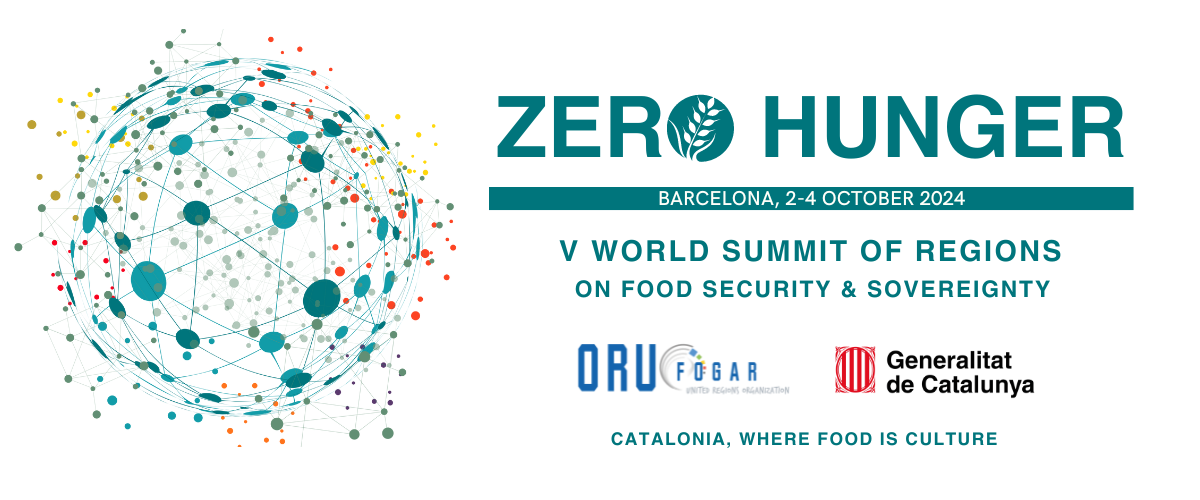The 5th Zero Hunger Summit will address climate change, food waste, and gastronomy

After four regional summits on food security held outside of Europe (Senegal, Colombia, Ecuador, and Chile), the 5th Zero Hunger Regional Summit, which will take place in Barcelona from October 2nd to 4th, will focus on some topics that have not previously received enough attention. These include Climate Change and its implications for agriculture, the prevention of food losses and waste, and the importance of gastronomy.
A summit titled Zero Hunger cannot, however, avoid addressing the fight against hunger and achieving SDG 2 of the 2030 Agenda, especially when, according to United Nations data, today approximately 9.2% of the world's population faces chronic hunger, which equates to around 735 million people. Additionally, 30% of the global population – 2.4 billion people - suffer from severe or moderate food insecurity and lack access to adequate food. Regions are extremely sensitive to the fact that the number of people experiencing food insecurity has continued to increase since 2015, and the pandemic, conflicts, climate change, and growing inequalities have worsened the situation.
Thus, halfway to the deadline for achieving the goals of the 2030 Agenda, it is essential to take decisive, coordinated, and urgent actions, and to accelerate the implementation of solutions that address deep-rooted inequalities, transform food systems, invest in sustainable agricultural practices, and reduce the effects of conflicts on nutrition and food security globally. The Summit, in any case, will show that regional governments play a key role as catalysts for significant global changes.
Climate change and agriculture
Currently, the basic resources to meet our primary needs for life and well-being, including food, are threatened by erosion, loss of fertile soil, deforestation, pollution, lack of water availability, and loss of biodiversity.
Events such as irregular rainfall patterns, increased episodes of drought, extreme weather events, rising sea levels leading to flooding or salinization of fertile lands like deltas, are already occurring and intensifying. In fact, the climate crisis manifests its most acute forms in the shape of food crises. The successive cereal price crises of 2007, 2010, 2012, and 2022 are early evidence of this.
The 5th Zero Hunger Summit will address the issue from different approaches. From the production of more productive and efficient crops or animals, which are more resistant to diseases or pests and require less water. To more sustainable agricultural practices that are in harmony with the environment. From precision agriculture, where cultivation an receive its nutrition supply precisely tailored to its needs, minimizing potentially contaminating waste and water requirements.
Preventing food loss and waste
Preventing food loss and waste throughout the chain, from primary production to the final consumer, is key to moving towards a sustainable food system.
According to data from the Food and Agriculture Organization of the United Nations (FAO), one-third of the food produced annually for human consumption worldwide is lost or goes uneaten by anyone.
At the 5th Summit, this area will play a significant role and will focus on best existing practices, such as those that distinguish between food waste and food loss. In low-income countries, food is lost at the initial stages of the food chain and in intermediate stages. Losses occur due to difficulties in transportation and lack of adequate storage facilities. In these countries, however, much less food is wasted at the consumption level. In higher-income countries, on the other hand, food is wasted at the consumption stage, meaning it is discarded when it is still suitable for human consumption.
The importance of gastronomy
Cooking is geography, history, and culture. Tasting its products and enjoying them is synonymous with strolling through the customs of an entire region.
Each typical dish carries a story behind its ingredients and preparation methods. That is why it is part of the intangible heritage, which allows the world to tell the story of a society through the elements that identify it, with gastronomy being an important part of them.
Furthermore, rescuing gastronomic heritage allows a community's evolution to be based on the most suitable production mechanisms, consumption habits, and nutrition for them. This traditional knowledge and skills are passed down from generation to generation, allowing for a more sustainable and responsible relationship with the environment.
However, we must not forget that food heritage, like cultures, is not static but evolves and adapts to the new needs of the moment and the social group.
In fact, more regional governments are recognizing food heritage with the aim of valorizing local products and gastronomy, which helps to root the population in rural areas. However, this also prompts us to consider the links and balance between rural and urban areas.
Catalonia is a region with a millennial-old gastronomic culture, rich in high-quality local products, both traditional and innovative. Catalan cuisine is part of the Mediterranean diet, one of the healthiest in the world, based on a high consumption of plant-based foods, olive oil, cereals, and fresh, seasonal products.
This 5th Zero Hunger Summit, held in Barcelona, Catalonia, provides an extraordinary framework to highlight and strengthen the gastronomic and culinary pride of different regions around the world.










































































